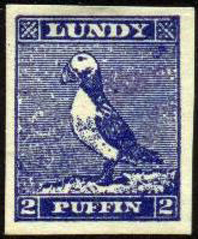
Lundy is the largest island in the Bristol Channel. It lies 12 miles (19 km) off the coast of Devon, England, about a third of the distance across the channel from Devon to South Wales. Lundy gives its name to a British sea area and is one of the islands of England. It has been designated by Natural England as national character area 159, one of England's natural regions.

The Penny Black was the world's first adhesive postage stamp used in a public postal system. It was first issued in Great Britain on 1 May 1840, but was not valid for use until 6 May. It features a profile of Queen Victoria.

Postage stamps and postal history of Great Britain surveys postal history from the United Kingdom and the postage stamps issued by that country and its various historical territories until the present day.

Ascension Island is an island in the South Atlantic Ocean, a dependency of the British overseas territory of Saint Helena. Like other British territories, it issues its own postage stamps, which provide a source of income for the island from sales to overseas collectors, as well as being used for domestic postage.
The Collectors Club, often referred to as the Collectors Club of New York, is a private club and philatelic society in New York City. Founded in 1896, it is one of the oldest existing philatelic societies in the United States. Its stated purpose is "to further the study of philately, promote the hobby and provide a social, educational, and non-commercial setting for the enthusiastic enjoyment of our common passion".

John Harry Robson Lowe, Robbie to his friends, was an English professional philatelist, stamp dealer and stamp auctioneer.

Sir Edward Denny Bacon, KCVO was a British philatelist who helped with the enlargement and mounting of collections possessed by rich collectors of his time and became the curator of the Royal Philatelic Collection between 1913 and 1938.

Walter Morley (1863-1936) was a pioneering English philatelist, stamp dealer and philatelic author.
The Stuart Rossiter Trust is a British charitable trust that was created by the will of the philatelist and postal historian Stuart Rossiter and subsequently the will of his mother.

A specimen stamp is a postage stamp or postal stationery indicium sent to postmasters and postal administrations so that they are able to identify valid stamps and to avoid forgeries. The usual method of invalidating the stamps is either overprinting in ink or perforating the word Specimen across the stamp and where English is not the common language, the words Muestra (Spanish), Monster (Dutch), Muster (German) or Образец have been used instead.
David Richard Beech MBE was the curator of the British Library Philatelic Collections from 1983–2013. He is a Fellow and past President of the Royal Philatelic Society London (RPSL). In 2013, it was announced that Beech will receive the Smithsonian Philatelic Achievement Award for outstanding lifetime accomplishments in the field of philately.

Nevis, a British colony in the Leeward Islands, began issuing stamps in 1861.

This is a survey of the postage stamps and postal history of Tristan da Cunha.

The British Library Philatelic Collections is the national philatelic collection of the United Kingdom with over 8 million items from around the world. It was established in 1891 as part of the British Museum Library, later to become the British Library, with the collection of Thomas Tapling. In addition to bequests and continuing donations, the library received consistent deposits by the Crown Agency and has become a primary research collection for British Empire and international history. The collections contain a wide range of artefacts in addition to postage stamps, from newspaper stamps to a press used to print the first British postage stamps.

The Chinchen Collection is a collection of stamps, proofs, artwork and covers from Lundy Island donated by Barry Chinchen to the British Library Philatelic Collections in 1977 and is located at the British Library.

The Tapling Collection of postage stamps was donated to the British Museum from the estate of Thomas Tapling in 1891.

The Crown Agents Philatelic and Security Printing Archive was deposited with the British Museum from the 1960s, though the first recorded deposit from the Crown Agents was in 1900. The archive consists of a range of philatelic and written material which were the Crown Agents' working records. It is the most comprehensive record of British Colonial and Commonwealth stamp issues of the last 100 years.
The Fitzgerald Collection is an extensive philatelic collection of air mail stamps donated to the British Library and announced in 1951.

This is a survey of the postage stamps and postal history of Transvaal, formerly known as the South African Republic.

















